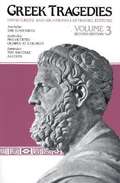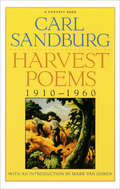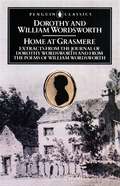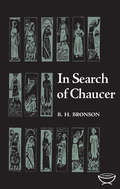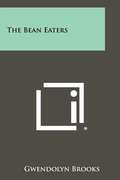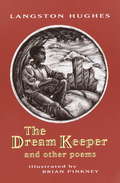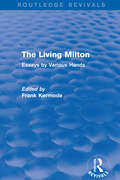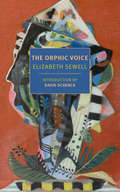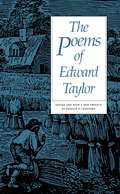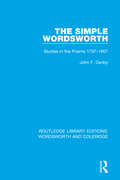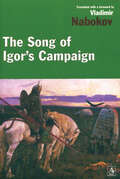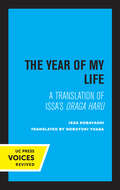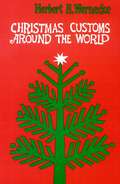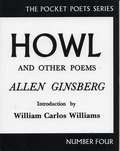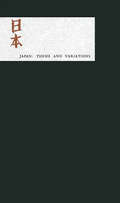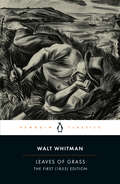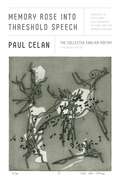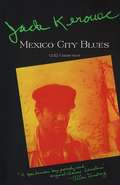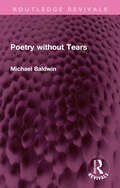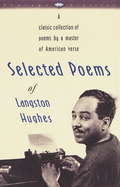- Table View
- List View
Greek Tragedies, Vol. 3
by David Grene Richmond LattimoreIn three paperback volumes, the Grene and Lattimore editions offer a selection of the most important and characteristic plays of Aeschylus, Sophocles, and Euripides from the nine-volume anthology of The Complete Greek Tragedies. This volume contains Aeschylus: The Eumenides; Sophocles: Philoctetes, Oedipus at Colonus; Euripedes: The Bacchae, Alcestis.
Harvest Poems: 1910–1960
by Carl SandburgThe great American poet’s essential collection spanning fifty years of verse—with an introduction by Mark Van Doren.With major contributions in the realms of journalism, biography and children’s fiction, Carl Sandburg was a luminary of twentieth-century American literature. But he was first a foremost a poet who transformed the diversity of his experience into powerfully vivid and beloved verse. His many collections won numerous accolades, including two Pulitzer Prizes.This selection of Sandburg’s poems is culled from half a century of output and includes thirteen poems appearing in book form for the first time. As this collection so masterfully demonstrates, “[Sandburg’s poetry] is independent, honest, direct, lyric, and it endures, clamorous and muted, magical as life itself” (New York Times).
Home at Grasmere: Extracts from the Journal of Dorothy Wordsworth and from the Poems of William Wordsworth
by Dorothy Wordsworth William WordsworthA continuous text made up of extracts from Dorothy Wordsworth's Journal and a selection of her brother's poems. Dorothy Wordsworth kept her Journal 'because I shall give William pleasure by it'. In doing so, she never dreamt that she was giving future readers not only the chance to enjoy her fresh and sensitive delight in the beauties that surrounded her at Grasmere but also a rare opportunity to observe 'the progress of a poet's mind'. Colette Clark's skilful and perceptive arrangement of Dorothy's entries alongside William's poems throws a unique light on his creative process, and shows how the interdependence of brother and sister was a vital part in the writing of many of his great poems. By reading these poems in relation to the Journal it is possible to trace the processes by which they were committed to paper and so achieve a fuller understanding of them. A writer in her own right, Dorothy kept her Journal sparse in personal and emotional detail. Yet there is, nevertheless, a deep emotional undercurrent running beneath the surface which only falters when William marries Mary Hutchinson. Never again was Dorothy to achieve the freedom, spontaneity and the limpidly beautiful prose with which she infused and irradiated the Grasmere Journals.
In Search of Chaucer (The Alexander Lectures Series #1958-59)
by Bertrand H. BronsonIn this volume, Professor Bronson is primarily interested in the three worlds which appear in Chaucer's poetry: the dream world; the world of the mundane existence and waking observation; and the world of imagined life through reading. A study of these worlds raises questions about the kind of truth which resides in each, the literary values which can be extracted from them, their essential relation to one another, and the perennial problem of appearance and reality. <P><P>Professor Bronson is also concerned with the general critical approach to Chaucer's writings. He feels that many recent Chaucerian scholars have been misled by their application of critical disciplines nourished on the metaphysical poets to a poet who deliberately practised a style capable of being followed by a moderately attentive ear. The fact that Chaucer's poetry was composed for oral delivery has received no more than lip service from critics; yet Chaucer's relation to his audience is obviously of the greatest importance in understanding his poems. It behooves us, therefore, to clarify our thoughts as to the kind of techniques we may fittingly apply. Professor Bronson suggests that a less sophisticated way of looking at the subject might yield better results. <P> Professor Bronson's book is a form of introduction to this new view of Chaucer; it is not a complete guide but an explanatory visit to each sphere of Chaucer's world, skillfully evocative of the people of the dream legends, the pilgrimage, the literary heroes and heroines of the Middle Ages, whom Chaucer brought into his poetry. This book is decorated with drawings in the manner of woodcuts taken from the three worlds of Chaucer's poetry. The Alexander Lectures for 1958-59.
Land of the Reed Plains: Ancient Japanese Lyrics from the Manyoshu
by Kenneth Yasuda Sanko InoueThis collection of Japanese poetry and paintings is a wonderful addition to the collection of any enthusiast of Japanese poetry or culture.<P><P>Land of the Reed Plains presents a rare and beautiful combination of Japanese lyric genius and artistic mastery. The poetry comes from the Manyoshu, Japan's earliest and greatest anthology and masterpiece of world literature, ably translated by Kenneth Yasuda. The 100 paintings that accompany the poems, each in full color, are the work of the contemporary Japanese artist Sanko Inoue.Their ability to evoke the beauties of an ancient past in a technique that speaks both of tradition and of today, confirms again the high and versatile place Sanko occupies in Japan's art world.
Mitti Ke Manav
by Jay Shankar TripathiThe poet has shown the state of the village Ahcalpur through his poem. The village is surrounded by hills and a river. The poet has made the villagers and farms the medium of the poem.
The Dream Keeper and Other Poems
by Langston HughesIllus. in black-and-white. This classic collection of poetry is available in a handsome new gift edition that includes seven additional poems written after The Dream Keeper was first published. In a larger format, featuring Brian Pinkney's scratchboard art on every spread, Hughes's inspirational message to young people is as relevant today as it was in 1932.From the Trade Paperback edition.
The Living Milton: Essays by Various Hands (Routledge Revivals)
by Sir Frank KermodeVarious aspects of Milton are explored in this collection of essays by scholars whose reputations were, at the time of publication in 1960, perhaps largely based on their writings on more modern subjects. This had the advantage of demonstrating that Milton as a poet is "alive" and that other attempts to represent him as irrelevant to the interests of the modern reader had failed. The essays offer to admirers of Milton and of modern poetry cogent and mature arguments for restoring a great poet to his proper authority in our literary life.
The Orphic Voice: Poetry and Natural History
by Elizabeth SewellA wondrously written book of literary criticism and philosophy that maps the relationship between poetry and natural history, connecting verse from poets such as Shakespeare and Rainer Maria Rilke to the work of scientists and theorists like Francis Bacon and Michael Polanyi.Taking its bearings from the Greek myth of Orpheus, whose singing had the power to move the rocks and trees and to quiet the animals, Elizabeth Sewell&’s The Orphic Voice transforms our understanding of the relationship between mind and nature. Myth, Sewell argues, is not mere fable but an ancient and vital form of reflection that unites poetry, philosophy, and natural science: Shakespeare with Francis Bacon and Giambattista Vico; Wordsworth and Rilke with Michael Polanyi. All these members of the Orphic company share a common perception that &“discovery, in science and poetry, is a mythological situation in which the mind unites with a figure of its own devising as a means toward understanding the world.&” Sewell&’s visionary book, first published in 1960, presents brilliantly illuminating readings of A Midsummer Night&’s Dream and Rilke&’s Sonnets to Orpheus, among other masterpieces, while deepening our understanding not only of poetry and the history of ideas but of the biological reach of the mind.
The Poems of Edward Taylor
by Edward TaylorNow considered America's foremost colonial poet, Edward Taylor was virtually unknown until some of his poems were discovered in the Yale library and published in 1937. The intellectual brilliance and the emotional intensity of his poetical meditations have led critics to compare him to John Donne and George Herbert. These poems are now recognized as one of the great achievements in American devotional literature.
The Simple Wordsworth: Studies in the Poems 1979-1807 (RLE: Wordsworth and Coleridge #4)
by John F. DanbyFirst published in 1960, this book studies Wordsworth’s ‘simple’ poems, such as the Lyrical Ballads, as products of a sophisticated and powerfully successful literary genius. The author aims to approach the poems as perhaps Wordsworth expected his first readers to; but as they have never been in fact. The result of this approach is to discover a Wordsworth far different to that which he has previously been presented as — the ‘Sage of Rydal’ at one extreme and a naïve perpetrator of poetical blunders at the other — and, the author argues, a far more exciting one. This book will be of interest to students of literature.
The Song of Igor's Campaign
by Vladimir NabokovThe author of Lolita translates the celebrated, medieval epic Russian poem about a doomed campaign led by Prince Igor Sviatoslavich the Brave.A chivalric expedition is undertaken in the late twelfth century by a minor prince in the land of Rus’ to defeat, against overwhelming odds, a powerful alliance in a neighboring territory. The anonymous poet who chronicled this adventure packed unprecedented metaphorical agility, keenness of observation, and fascinating imagery into the lean and powerful tale of the doomed campaign. Discovered in the late eighteenth century and only narrowly distributed, the original manuscript was destroyed in a fire, leading to endless debate about the provenance and authenticity of the extant versions. It also served as the basis of Borodin’s opera Prince Igor. Translated by Vladimir Nabokov, the verses that constitute “The Song of Igor’s Campaign” are presented in their original rhyme and meter, and Nabokov’s extensive annotations provide illuminations on all the aspects of the text.
The Year of My Life, Second Edition: A Translation of Issa's Oraga Haru
by Issa KobayashiThis title is part of UC Press's Voices Revived program, which commemorates University of California Press’s mission to seek out and cultivate the brightest minds and give them voice, reach, and impact. Drawing on a backlist dating to 1893, Voices Revived makes high-quality, peer-reviewed scholarship accessible once again using print-on-demand technology. This title was originally published in 1960.
To Bedlam and Part Way Back
by Anne SextonThis book of poems has the cumulative impact of a good novel. It has the richness variety and compactness of true poetry. It is a book to read and remembered. Sexton is an accomplished lyricist. She can combine the straightforwardness of playing on his speech with the saddle with the control, tight formal structure, and brilliantly effective imagery. But she makes her singular claim on our attention by the fact that she has important things to tell us and tells them dramatically.
Christmas Customs Around the World
by Herbert H. Wernecke[from the back cover] "STUDY, DEVOTION, AND INSPIRATION Sure to fascinate everyone who celebrates Christmas and to give extra pleasure to readers with special interest in folkways." The author has gathered meticulously from many sources, including records of missionaries, a remarkable variety of Christmas miscellanea intended to 'supplement rather than duplicate' other books on Christmas customs. Divided geographically by continent and by country, this book discusses the Christmas celebration, with special emphasis on geographical and cultural influences. Vernacular terminology with English equivalents adds reality and interest. A selection of Christmas recipes and suggestions for a Christmas program based on world-wide customs complement the text which describes both secular and religious Christmas observances. Recipes, a bibliography and indices are included.
How Does a Poem Mean
by John CiardiThere are many volumes designed to introduce college students to literature. What novelty can be claimed for this book comes from its plan. The four skilled and experienced teachers who have served as editors were not limited in their work by any imposed uniformity of treatment.
Howl and Other Poems
by Allen Ginsberg William Crarlos WilliamsPoems by the voice of the Beat Generation. Introduction by William Carlos Williams.
Japan: A Collection of Poems by Americans
by Charles E. TuttleThis collection of Japanese poetry contains over 200 poems by some 153 Americans writing of their impressions and experiences of Japan.<P><P>If Japan forms the theme of the poems collected here, the variations are certainly the deep feeling so many Americans have come to have for Japan and the Japanese People. And the Resulting Choral is, we are convinced, both a thing of beauty and unique expression of goodwill between nations.Through the many years and in many countries poets have been entranced with the romances suggested by the name Japan. They have enthralled the sweetness of its children; serenity of its art; the beauty of its fields, seas, and mountains; the grandeur of its ancient architecture and quiet gardens; colorful pageantry of its history and deep emotions of its drama; the industriousness of its workers, charm of its women, and indomitable character of its people.
Leaves of Grass: The First (1855) Edition
by Walt WhitmanThis is the original and complete 1855 edition of one of the greatest masterpieces of American literature, including Whitman's own introduction to the work. .
Mai Dilli Hu
by Ramavtar TyagiThe history of Delhi is presented in the form of poetry. The book tries to put both the story and poem together. The history of Delhi has been put in the chronological way.
Memory Rose into Threshold Speech: The Collected Earlier Poetry: A Bilingual Edition
by Paul CelanMemory Rose into Threshold Speech gathers the poet Paul Celan's first four books, written between 1952 and 1963, which established his reputation as the major post-World War II German-language poet.Celan, a Bukovinian Jew who lived through the Holocaust, created work that displays both great lyric power and an uncanny ability to pinpoint totalitarian cultural and political tendencies. His quest, however, is not only reflective: there is in Celan's writing a profound need and desire to create a new, inhabitable world and a new language for it. In Memory Rose into Threshold Speech, Celan’s reader witnesses his poetry, which starts lush with surrealistic imagery, become gradually pared down; its syntax tightens and his trademark neologisms and word formations increase toward a polysemic language of great accuracy that tries, in the poet's own words, "to measure the area of the given and the possible."Translated by the prize-winning poet and translator Pierre Joris, this bilingual edition follows the 2014 publication of Breathturn into Timestead, Celan's collected later poetry. All nine volumes of Celan's poetry are now available in Joris's carefully crafted translations, accompanied here by a new introduction and extensive commentary. The four volumes in this edition show the flowering of one of the major literary figures of the last century.This volume collects Celan’s first four books: Mohn und Gedächtnis (Poppy and Memory), Von Schwelle zu Schwelle (Threshold to Threshold), Sprachgitter (Speechgrille), and Die Niemandsrose (NoOnesRose).
Mexico City Blues
by Jack Kerouac"Mexico City Blues" is Kerouac's only collection of poetry. He roams across continents and cultures in a search for meaning and expression.
Poetry without Tears (Routledge Revivals)
by Michael BaldwinFirst published in 1959, Poetry without Tears is a book not about what poetry is. The author argues that this book is not concerned with the educational resurrection of a dead art but about the artistic resurrection of education. Poetry is a force released in activity. That is how an educationalist and a poet see it. It is rarely how critics and academics see it. They see it as a series of poems, correspondingly it is as a ‘Collection of Poems’ that it is taught. Basic educational truths are frequently overlooked in our teaching of the arts, and no art suffers more from this than poetry. Baldwin goes on to say that in the end teaching is a creative activity and the creators are the best teachers. This book is a must read for students of both literature and education.
Selected Poems of Langston Hughes
by Langston HughesWith the publication of his first book of poems, The Weary Blues, in 1926, Langston Hughes electrified readers and launched a renaissance in black writing in America. The poems Hughes wrote celebrated the experience of invisible men and women: of slaves who "rushed the boots of Washington"; of musicians on Lenox Avenue; of the poor and the lovesick; of losers in "the raffle of night." They conveyed that experience in a voice that blended the spoken with the sung, that turned poetic lines into the phrases of jazz and blues, and that ripped through the curtain separating high from popular culture. They spanned the range from the lyric to the polemic, ringing out "wonder and pain and terror-- and the marrow of the bone of life."The poems in this collection were chosen by Hughes himself shortly before his death in 1967 and represent work from his entire career, including "The Negro Speaks of Rivers," "The Weary Blues," "Still Here," "Song for a Dark Girl," "Montage of a Dream Deferred," and "Refugee in America." It gives us a poet of extraordinary range, directness, and stylistic virtuosity.
